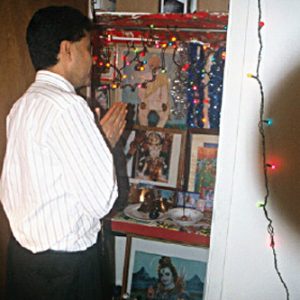calsfoundation@cals.org
Hindus
An estimated 15,000 Hindus were living in Arkansas by the first decades of the twenty-first century. This small group of Arkansas Hindus is very committed to preserving and promoting the religious and cultural diversity of its religion. Hindus also contribute significantly to the educational and economic life of Arkansas.
Hinduism is regarded by many scholars as the world’s oldest living religion, and it is the third largest in number of adherents. Currently, there are about one billion followers, ninety percent of whom live in India, where the religion originated. Hinduism is not only a religion but also a culture and a philosophy. Fundamental to the ideas and practices is the belief in ultimate truth/reality, called Brahman, and its identity with the individual’s inner soul, called jeeva or atman. Hindus believe in a virtually endless cycle of birth, death, and rebirth. One’s status of rebirth is determined by one’s karma, or deeds during the current life. This cycle of rebirth can be broken only by spiritual self realization and the complete identity of atman with Brahman. This is called moksha.
A vast body of Hindu scriptures was developed over a long period of time; the most well known to Westerners are the Vedas, the Bhagavad Gita, and the Upanishads. Unlike other religions, Hinduism has no founder and no date of origin. Hindus refer to their religion as Sanatan Dharma (“eternal religion”). Though a crude translation of the word “Dharma” is “religion,” its greater meaning includes personal duty, responsibility for righteousness, and respect for universal values such as truth, honesty, integrity, and nonviolence. God is considered the realm of existence of Brahman, and Hindus worship deities while recognizing the idol as a representation rather than reality.
Although isolated Hindu families have lived in the United States since the beginning of the twentieth century, large numbers of Indians started arriving in the United States in the late 1960s. Many initial immigrants were engineers and physicians, and most settled in large metropolitan areas. In-migration to smaller cities and towns followed. Among the early arrivals in Arkansas were Dr. Haridas Mazumdar and his wife, Amu Mazumdar, who arrived in the mid-1950s. Mazumdar was dean of the College of Arts and Science at what is now the University of Arkansas at Pine Bluff (UAPB), and his wife was a professor of social work at the University of Arkansas at Little Rock (UA Little Rock). Many Hindus in Arkansas are physicians, engineers, computer professionals, business professionals, or hotel/motel operators.
Initially there was no designated place of worship in Arkansas. Most Hindus, however, have a designated place of worship in their homes. Early Arkansas immigrants gathered at friends’ houses for worship and cultural exchanges on special occasions. The Vedanta Society of Arkansas was founded in Pine Bluff (Jefferson County) in 1989 for the purpose of worship and religious exchanges, and it moved to Little Rock (Pulaski County) in the early 1990s. Dr. Gurdeep Khullar, a professor of sociology at UAPB, was its first president. The society has operated Vedanta Cultural Center (Shiva Vishnu Temple) on Nash Lane in Mabelvale (Pulaski County) since 2005. Hindus gather at the center regularly for religious services and cultural exchanges. There is also a Swaminarayan temple in North Little Rock (Pulaski County).
Approximately 1,200 Hindu families live in northwestern Arkansas. The Hindu Association of Northwest Arkansas (HANWA) bought land for a new temple in Bentonville (Benton County) in November 2009; it was officially consecrated in July 2012. HANWA organizes many religious activities in the community, as well as conducting religious classes for children. They also invite religious scholars from Chinmaya Mission to educate adults in the community. In 2020, HANWA constructed the Gita Stupa monument, consisting of a lotus flower with a granite statue of Lord Krishna in the center; the lotus flower has nine petals with eighteen surfaces, representing the eighteen chapters of the Gita, which is engraved on the petals.
The Hindu Temple of Central Arkansas (HTCAR) was started in 2017 and the construction was completed in 2020, with the inauguration in October 2020. The temple is on twenty-two acres on Dineen Drive in Little Rock.
Hindus celebrate many religious holidays. Among the most important are Holi, Navaratri, and Diwali. Hindus follow a lunar calendar; therefore, the holidays fall on different dates each year. Holi generally comes in March, and Navaratri and Diwali occur between September and November. Holi is a festival of colors, and Diwali is a festival of lights. Arkansas Hindus gather in large numbers to celebrate these holidays. Navaratri is a nine-day event to celebrate and worship the goddess Shakti. Throughout Arkansas during this festival, Gujarati Samaj Hindus (from the state of Gujarat in India) gather in the evening and celebrate with folk dances called Garba-Raas. Bengalis (from the state of Bengal in India) perform Durga Pooja.
For additional information:
Hahn, Heather. “Groups Expect at Least 500 at Hindu Fest.” Arkansas Democrat-Gazette, November 10, 2007, pp. 1B, 7B.
Hindu Association of Northwest Arkansas. http://www.nwahindutemple.org/ (accessed April 20, 2022).
Hindu Temple of Central Arkansas. https://www.htcarlr.org/ (accessed September 28, 2022).
Jones, Francisca. “Enlightenment: Central Arkansas’ Hindu Community Celebrates Diwali with Lights and Merriment.” Arkansas Democrat-Gazette, November 10, 2018, pp. 4B, 5B.
Shiva Vishnu Temple of Little Rock. https://svtemplelr.org/?msclkid=74e167e9c0cb11ecb46a093790aa24ee (accessed April 20, 2022).
Stambuck, Heidi. “Hindu Temple in Future.” Morning News, November 11, 2005.
Storm, Christie. “Breaking Ground.” Arkansas Democrat-Gazette, October 22, 2011, pp. 4B, 5B.
———. “Hindus to Consecrate Bentonville Temple.” Arkansas Democrat-Gazette, July 21, 2012, pp. 4B, 5B.
Vedanta Society of Arkansas. http://www.vsalr.org/ (accessed April 20, 2022).
Dileep R. Vyas
Little Rock, Arkansas
 Hindu Worship
Hindu Worship 




Comments
No comments on this entry yet.